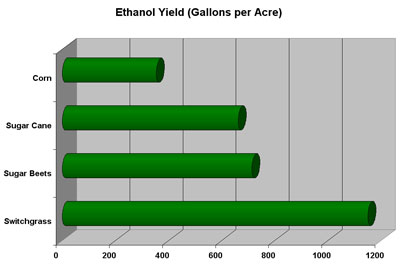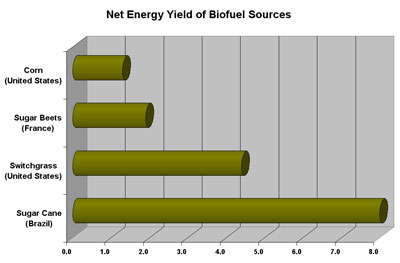Beyond high food prices, little to show for $11B/yr in biofuel support, says OECD report
Beyond high food prices, little to show for $11B/yr in biofuel support, says OECD report
mongabay.com
July 17, 2008
Government support of biofuel production in rich countries is squandering vast amounts of amounts of money while exacerbating the global food crisis and failing to meaningfully curb greenhouse gas emissions and improve energy security, alleges a new report from the OECD, the club of industrialized nations.
The report — Economic Assessment of Biofuel Support Policies — says biofuels are largely dependent on state funding for viability. It estimates that in the U.S., Canada and the European Union, governments pumped 11 billions of dollars into subsidies and support for biofuels in 2006. Spending is expected to rise to 25 billion per year by 2015.
The OECD identifies budgetary measures, blending mandates, and trade restrictions as “support” for biofuels.

Ethanol yield for various crops
Net energy yield for various crops |
“Limited impact on reducing greenhouse gases”
The reports says the spending frenzy is having a marginal impact on greenhouse gas emissions. It calculates that biofuel support costs between $960-$1700 per ton of carbon dioxide emissions avoided — or 25-50 times the cost of a E. U. permit to emit a ton of CO2 — and notes that ethanol produced from sugar cane in Brazil is far more effective at reducing emissions relative to fossil fuels that biofuel feedstocks grow in Europe and North America.
“There are many more-efficient ways to protect the climate than supporting biofuels,” Stefan Tangermann, OECD’s director for trade and agriculture, was quoted as saying by Bloomberg. “These policies are inefficient because of their high costs and limited impact on CO2 emissions.”
The report estimates that the continuation of current support policies would reduce emissions from transport fuel by no more than 0.8 percent by 2015. Transport fuels account for less than 20 percent of global greenhouse emissions from human activities.
“Significant impact on world crop prices”
The OECD report links rising food prices to government subsidies for biofuels. It says that “current biofuel support measures alone are estimated to increase average wheat prices by about 5 percent, maize by around 7 percent and vegetable oil by about 19 percent over the next 10 years” and projects that “13 percent of world coarse grain production and 20 percent of world vegetable oil production could shift to biofuel production in the next 10 years, up from 8 percent and 9 percent in 2007.”
Policy measures
The report urges governments to develop policies that encourage lower energy consumption, especially in the transport sector. It calls for reductions in trade barriers for biofuel feedstocks and recommends increased emphasis on alternative fuels that minimize greenhouse gas emissions and the use of fossil fuels. The report encourages more research into next generation biofuels that do not require commodity feedstocks.
Economic Assessment of Biofuel Support Policies















